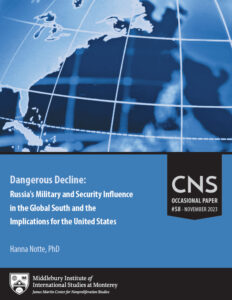Hanna Notte

This study argues that Russia seeks to boost its military and security influence in the Global South in light of what it considers a protracted, systemic confrontation with Western states. Russia’s capacity to accrue such influence will vary considerably by domain and country. The war against Ukraine and its effects on Russia’s economy, technology base, and reputation are shaping demand and supply side factors—what states in the Global South want from Russia, and what Russia can offer. Though Russian power projection in the Global South will be limited, the impact of Moscow’s actions on U.S. strategic interests will not be trivial.
Key takeaways
(1) Russia’s pivot to the Global South will intensify. Anticipating a long-term, systemic confrontation with Western states, Russia is prioritizing its power projection into the Global South, expecting economic, coercive, deterrent, and political benefits.
(2) Russian arms sales: Down but not out. The downward trajectory in Russia’s weapons exports to countries of the Global South will most probably continue, given demand- and supply-side constraints. Russia will, however, likely remain highly active in several areas: the provision of defense articles to its biggest legacy customers, such as India; intensified cooperation with sub-Saharan Africa for lower-end defense goods; efforts to enhance competitiveness in the export of its military drones; and increased weapons deliveries to states hostile to the United States and/or countries of proliferation concern.
(3) Russian PMCs: Preservation and rebranding. The Russian government is undertaking measures to ensure the continuity of its private military company (PMC) business in Africa. Following the recent death of the Wagner Group’s chief, Yevgeny Prigozhin, the group might morph into a semi-official entity tightly controlled by Russian state structures, be augmented or replaced by other PMCs, or a mixture of both. Regardless, Russia will most probably seek to retain a presence in core African theaters of operation (the Central African Republic, Libya, Mali, and Sudan) and may contemplate additional opportunities, in light of the recent coups in the Sahel.
(4) Other Russian activities: Playing the long game. Russia’s permanent military basing in the Global South will likely remain limited to Syria, though it will conduct intermittent shows of force (through port calls, overflights, and exercises) elsewhere in the Global South to boost its coercive reputation in areas of strategic interest to the United States. Russia will also seek to leverage other pressure points—disinformation, cooperation on nuclear energy, or its sway over the wartime export of grain—to consolidate influence in Global South countries.
(5) Russia’s decline will be a dangerous decline. In the Global South, Russia’s capacity for projecting a sustained military threat to U.S. interests will likely be limited. Russia’s various activities combined, however, highlight the dangers posed by a declining Russia. Moscow is intensifying its defense cooperation across regions with states hostile to Europe or the United States. It may form new defense “ecosystems,” characterized by mutual support and knowledge diffusion, with these players. Particularly in Africa, there is also a risk of Russian incremental gains having knock-on effects. Over the long term, however, the People’s Republic of China will pose the bigger challenge to U.S. interests in the Global South.
No comments:
Post a Comment